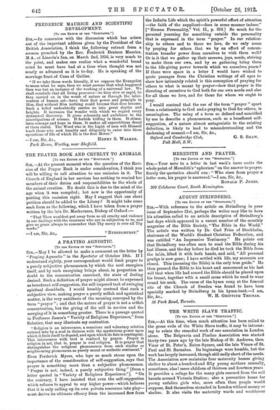A PRAYING AGNOSTIC. [To THE EDITOR 07 THE "SPECTATOR."] SIII,—May
I be allowed to make a comment on the letter by " Praying Agnostic" in the Spectator of October 19th. If I understand rightly, your correspondent would limit prayer to
a purely subjective phenomenon by which the soul energizes itself, and by such energizing brings about, in proportion no doubt to the concentration exercised, the state of feeling desired. Such a definition of prayer might almost be expressed as beneficent self-suggestion, the self-imposed task of swinging 'spiritual dumbbells. I would humbly contend that such a subjective view, making prayer a purely selfish and egotistical matter, is the very antithesis of the meaning conveyed by the term " prayer " ; and that the nature of prayer is not a selfish concentration, but the giving of the self in set vice and the merging of it in something greater. There is a passage quoted in Professor James's " Variety of Religious Experience," from Sabatier, that may illustrate my contention.
"Religion is an intercourse, a conscious and voluntary relation entered into by a soul in distress with the mysterious power upon which it feels itself to depend, and upon which its fate is contingent. This intercourse with God is realized by prayer. Prayer is religion in act, that is, prayer is real religion. It is prayer that distinguishes the religious phenomenon from such similar or neighbouring phenomena as purely moral or wsthetic sentiment."
Even Frederick Myers, who lays so much stress upon the importance of the consideration of self-suggestion, says that
prayer is something more than a subjective phenomenon. " Prayer is not, indeed, a purely subjective thing" [from a letter quoted in " Variety of Religious Experience."]. " On the contrary, I have insisted that even the self-suggestion which refuses to appeal to any higher power—which believes that it is only calling up its own private resources into play— must derive its ultimate efficacy from the increased flow from
the Infinite Life which the spirit's powerful effort of attention —the faith of the suppliant—does in some manner induce." [" Human Personality," Vol. IL, p. 313.] So much for 'the personal yearning for something outside the personality that is expressed in the term "prayer." In our relation- ship to others and to those we love, do we only mean by praying for others that we by an effort of concen- tration transfer power from ourselves to wish them well ? Or is it that we gather up their sorrows, joys, needs, striving to make them our own, and by so gathering bring them to the life-giving power towards which we ourselves yearn ? If there were space in a letter I would have wished to quote passages from the Christian writings of all ages to show how intimately related is this conception of praying for others to what is meant by prayer—how that prayer is the directing of ourselves to God both for our own needs and also for all those we love, and for those for whom we ought to pray.
I would contend that the use of the term " prayer " apart from a relationship to God and a praying to God for others, is meaningless. The using of a term so defined and sanctified by use to describe a phenomenon, such as a beneficent self- suggestion, of a nature almost antagonistic to the existing definition, is likely to lead to misunderstanding and the darkening of counseL—I am, Sir, &o., Oxford and Cambridge Club, G. S. SHAW. Pall Mall, S.W.


















































 Previous page
Previous page